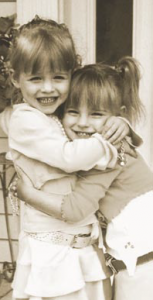Long before I became the mother of twins, I had a glimpse into their lives, because my mom is a twin. Throughout my childhood, my mom, Sue, and her twin sister, Esther, took center stage at family gatherings, as they told stories about growing up. One story stood out from the rest, and always began with my mom or Esther blurting out, “Remember when we cut our toe?”
The story itself was simple
The barefoot country girls were exploring an abandoned building, when one of them caught her foot on an old piece of pipe, slicing the skin between her toes. Her sister ran to get help. The fascinating part is that both Sue and Esther claimed to be the ones cut and bleeding. Both remembered the pain and the blood. Both remembered her sister running to get help. And both insisted she had a scar to prove it. But after shedding shoes and socks, neither could come up with a convincing scar, so the memory, like so many other things twins share, became both of theirs.

Rachel and Sarah 3 1/2
As if joined at the foot, Sue and Esther resolved their disagreement by sharing the injured toe.
The “disputed memories” phenomenon
As strange as this story may sound, the phe¬nomenon of “disputed memories” between twins is actually quite common. According to a study by psychologists at Duke University in Durham, N.C., and the University at Canterbury in Christchurch, New Zealand, “disputed memories are a relatively common occurrence among twins.” In their 2001 study, Sheen, Kemp, and Rubin defined a “disputed memory” as “a memory in which two people agree on most of the details of what happened, but disagree on (the person) to whom the event occurred.” Their study concluded that disputed memories “occur frequently among twins.”
Sandra Miller, an identical twin from Portland, Ore., echoes the study’s findings. She and her sister, Karen, have disagreed about many events over the years. Sandra recalls a skiing incident when she and her sister were young girls. “I was on the ski lift and Karen was trying to climb on with me,” Sandra says. “Karen slipped and fell to the snow below. I remember Karen yelling, ‘Hang on! Don’t let go of me!’ but I couldn’t hang on. I know I was the one on the lift because I remember seeing Karen’s face looking up at me from the snow, and I remember feeling remorse later for failing to hang onto my sister.”
But Sandra says Karen remembers it the other way. “Karen says that she was sitting on the ski lift and I was the one who fell.”
In their most recent study published in the journal, Genes, Brain and Behavior (2006), Sheen, Kemp, and Rubin sought to determine why some memories are disputed. Their findings showed when twins dispute a memory, “they claim for themselves memories for achievements and suffered misfortunes, but are more likely to give away memories of personal wrongdoing.” When twins do this, they have noticed, “claims to the ownership of memories are frequently self-serving.”
Disputed memories and the general population
Are disputed memories limited to twins? In their first study, Sheen, Kemp, and Rubin included same-sex twins (identical and fraternal), siblings close in age, and same-sex friends. Although they occasionally reported disputed memories among the non-twin groups, this occurred much less often than with twins. Zygosity was not a factor in the number of disputed memories among the twins, and boy/girl twins were not part of the study.
These researchers offer three reasons why twins may be more likely to have disputed memories:
• Twins share a close upbringing
• Twins have a high degree of empathy with each other
• Twins are more likely to talk to each other about their shared past, thereby discovering disputed memories.
One implication of this study is to question whether or not many of us have memories we have stolen from others. The majority of disputed memories are from events occurring in late childhood, so it is possible that some of us have “stolen” a memory from someone in our past. But the person we took it from is not around to correct us.
Can parents help twins resolve disputed memories?
Parents seemingly could offer information to help twins settle their conflicting memories. Unfortunately, in the case of my mom and her sister, they didn’t discover the memory was disputed until after their parents died. Sandra Miller says, “Most of the disputes between Karen and me were too insignificant for our parents to remember, or our parents were not present at the time.” In an attempt to see if parents could help resolve memory disputes, Sheen, Kemp, and Rubin asked parents of twins to name events that occurred to only one twin. Later, when they asked the twins about these events, only 2 of the 60 incidents were ever disputed by the twins. Interestingly, however, in 10 out of the 60 incidents, the twins agreed with each other about who was the central player, but disagreed with their parents!
The good news about disputed memories
The good news ascertained by these studies is that usually “disputed memories are not of very important events.” The researchers suspect it would be difficult to dispute memories of greater importance, such as who got straight A’s in high school, or who broke their arm, because there would be corroborating evidence to support one side. Sometimes I wonder which memories my twin boys will debate. Will they both say they were the one who slept on the top bunk because his brother was scared to do so? Will I remember? Will it matter? Recently, I asked my mom how she felt about sharing memories with her twin sister. She said, “It doesn’t bother me, because it doesn’t really matter which one of us it was. If Esther wants to have the cut toe, that’s fine with me!”

